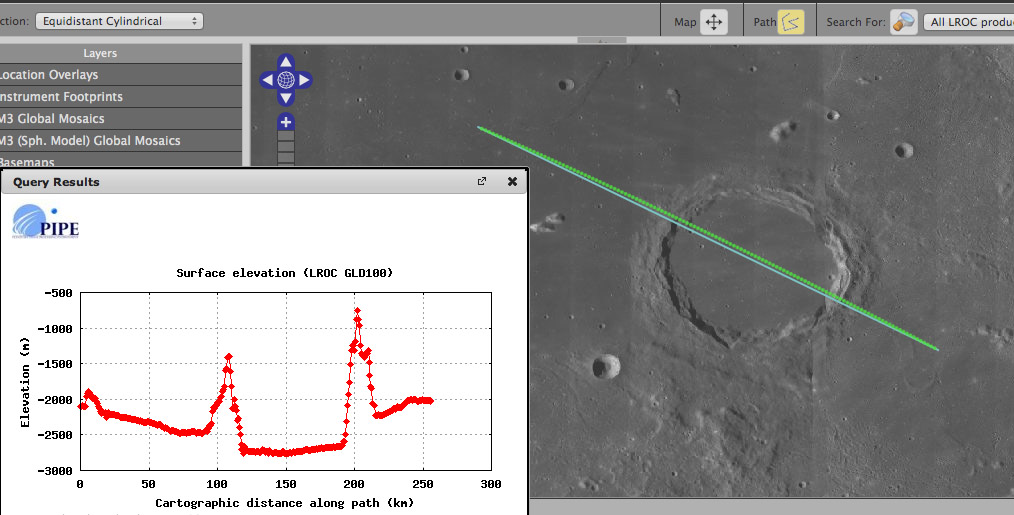Difference between revisions of "December 21, 2012"
| Line 4: | Line 4: | ||
<!-- ws:start:WikiTextHeadingRule:0:<h1> --> | <!-- ws:start:WikiTextHeadingRule:0:<h1> --> | ||
<!-- ws:start:WikiTextLocalImageRule:6:<img src="/file/view/LPOD-Dec21-12.jpg/394059618/LPOD-Dec21-12.jpg" alt="" title="" /> -->[[File:LPOD-Dec21-12.jpg|LPOD-Dec21-12.jpg]]<!-- ws:end:WikiTextLocalImageRule:6 --><br /> | <!-- ws:start:WikiTextLocalImageRule:6:<img src="/file/view/LPOD-Dec21-12.jpg/394059618/LPOD-Dec21-12.jpg" alt="" title="" /> -->[[File:LPOD-Dec21-12.jpg|LPOD-Dec21-12.jpg]]<!-- ws:end:WikiTextLocalImageRule:6 --><br /> | ||
| − | Three years ago LPOD featured an oblique [http://lpod. | + | Three years ago LPOD featured an oblique [http://www2.lpod.org/wiki/November_20,_2009 image] from Kaguya that surprisingly implied that the floor of Archimedes was higher than the surrounding maria. A little quantitative [http://www2.lpod.org/wiki/November_22,_2009 data] soon refuted that interpretation. Now, with the remarkably high quality LRO altimetry data we can confirm that the floor of Archimedes is lower than the nearby maria. The LRO traverse shows a declining elevation of Mare Imbrium approaching Archimedes, leveling off at about 2500 m below the Moon's average elevation. At its western edge the floor is ~250 m below the nearby mare, and about half way across the floor's elevation slowly increases by 50 to 100 m, but is still lower than maria to the east in Palus Putredinis. When it seemed that lavas on the floor were higher than nearby maria a possible interpretation was that the floor lavas came from deeper sources which would likely have had higher pressure to push lava to higher levels. Now that we know that the floor of Archimedes is lower the interpretation would be the opposite. The lavas on the crater's floor were probably supplied from a different source than the nearby lavas, and that source was presumably higher than the mare source region. Although some egos may be dented when new facts disagree with earlier interpretations that is the way science works, and is not the end of the world.<br /> |
<br /> | <br /> | ||
<em>[mailto:tychocrater@yahoo.com Chuck Wood]</em><br /> | <em>[mailto:tychocrater@yahoo.com Chuck Wood]</em><br /> | ||
| Line 10: | Line 10: | ||
<strong>Related Links</strong><br /> | <strong>Related Links</strong><br /> | ||
Rükl plate [https://the-moon.us/wiki/R%C3%BCkl_22 22]<br /> | Rükl plate [https://the-moon.us/wiki/R%C3%BCkl_22 22]<br /> | ||
| − | <em>[ | + | <em>[[21st Century Atlas of the Moon|21st Century Atlas]]</em> chart 18.<br /> |
<br /> | <br /> | ||
<p><b>Yesterday's LPOD:</b> [[December 20, 2012|Background]] </p> | <p><b>Yesterday's LPOD:</b> [[December 20, 2012|Background]] </p> | ||
Latest revision as of 07:25, 28 October 2018
Not the End of the World

Three years ago LPOD featured an oblique image from Kaguya that surprisingly implied that the floor of Archimedes was higher than the surrounding maria. A little quantitative data soon refuted that interpretation. Now, with the remarkably high quality LRO altimetry data we can confirm that the floor of Archimedes is lower than the nearby maria. The LRO traverse shows a declining elevation of Mare Imbrium approaching Archimedes, leveling off at about 2500 m below the Moon's average elevation. At its western edge the floor is ~250 m below the nearby mare, and about half way across the floor's elevation slowly increases by 50 to 100 m, but is still lower than maria to the east in Palus Putredinis. When it seemed that lavas on the floor were higher than nearby maria a possible interpretation was that the floor lavas came from deeper sources which would likely have had higher pressure to push lava to higher levels. Now that we know that the floor of Archimedes is lower the interpretation would be the opposite. The lavas on the crater's floor were probably supplied from a different source than the nearby lavas, and that source was presumably higher than the mare source region. Although some egos may be dented when new facts disagree with earlier interpretations that is the way science works, and is not the end of the world.
Chuck Wood
Related Links
Rükl plate 22
21st Century Atlas chart 18.
Yesterday's LPOD: Background
Tomorrow's LPOD: Big Rims
COMMENTS?
Register, Log in, and join in the comments.



